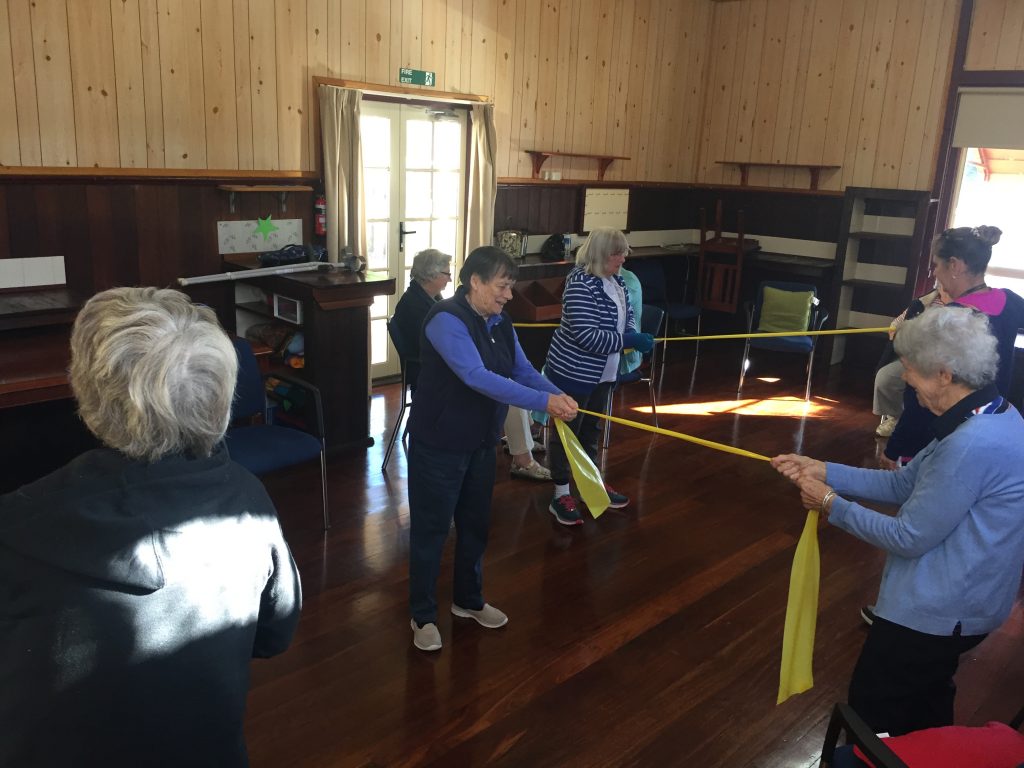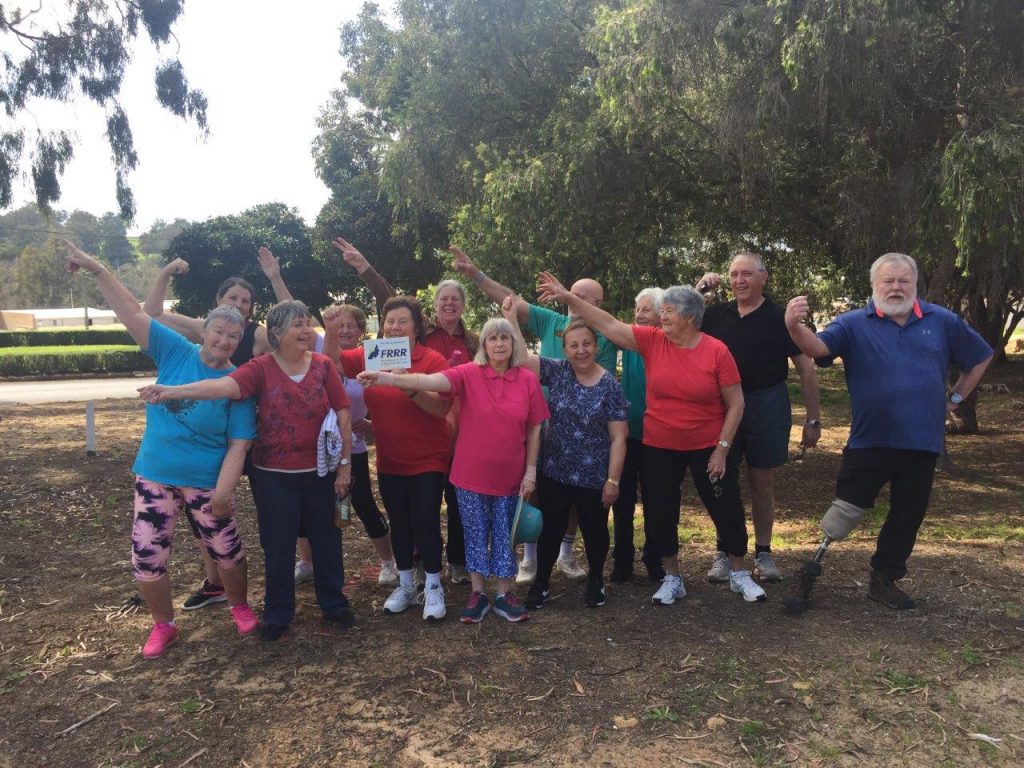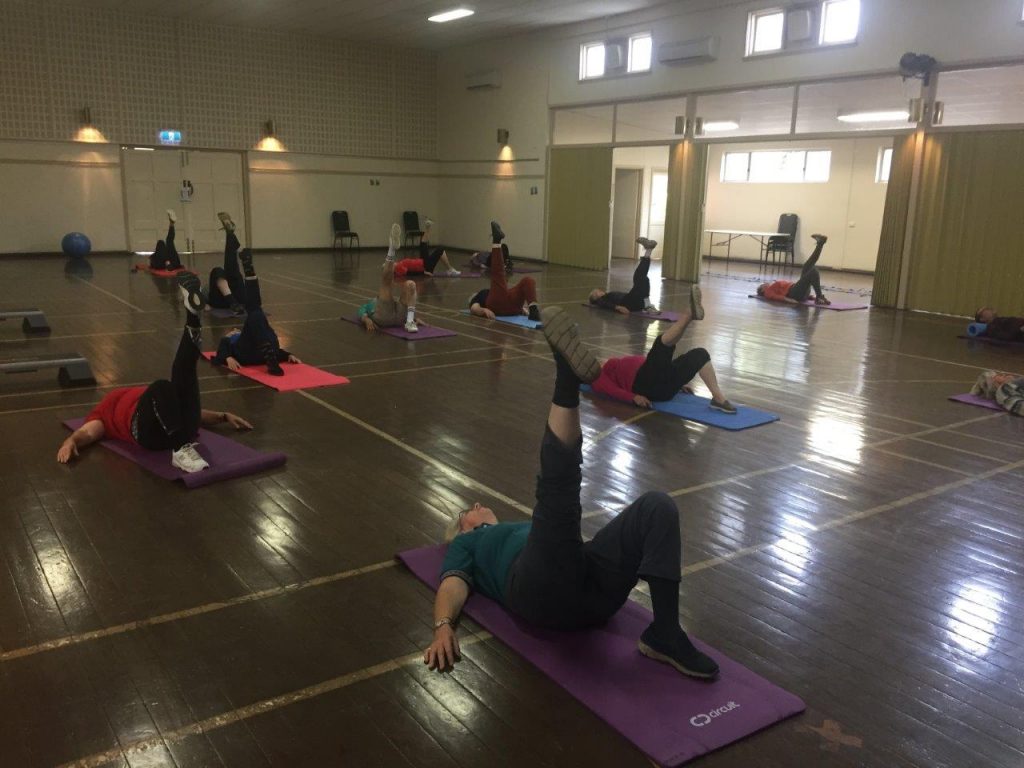Foundation for Rural & Regional Renewal (FRRR)
Environs Kimberley (EK) is the peak not-for-profit environmental organisation for the remote Kimberley region of Western Australia. Since 1996 EK has been dedicated to conserving and protecting the Kimberley’s natural, environmental, and cultural values. EK has supported and coordinated cultural-natural resource management (CNRM) projects in the region since 2007.
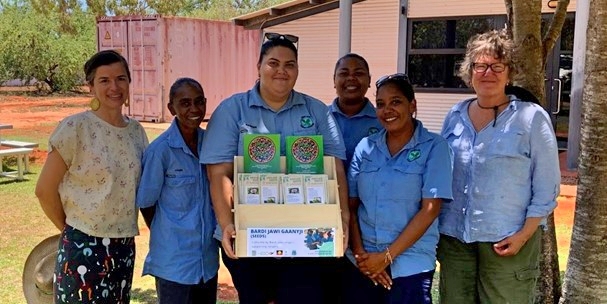
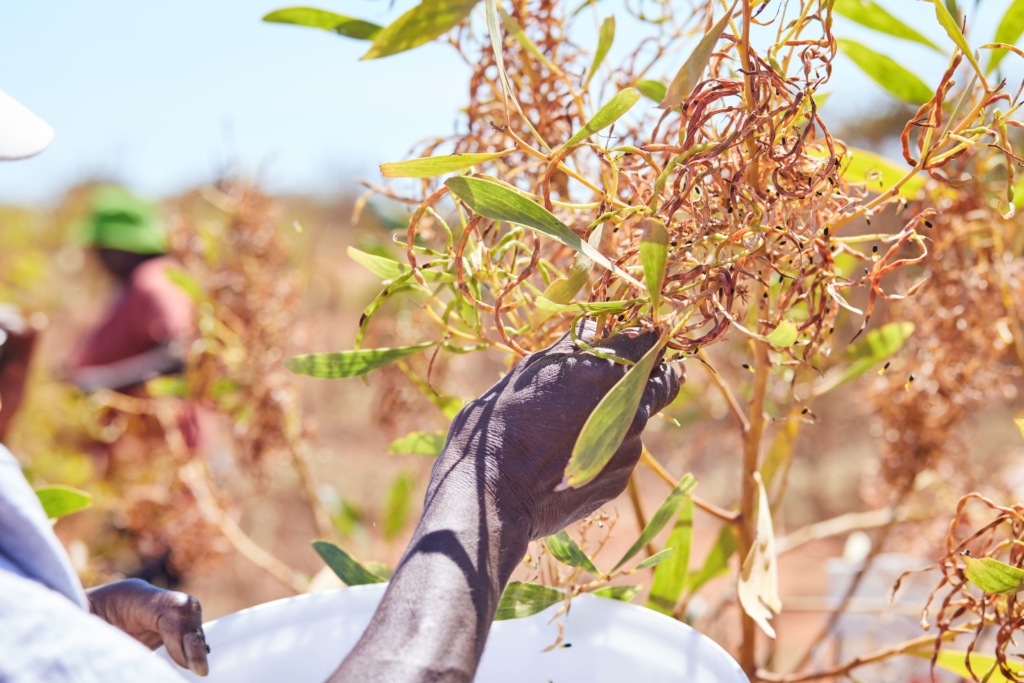
Nyangumarta seed collecting 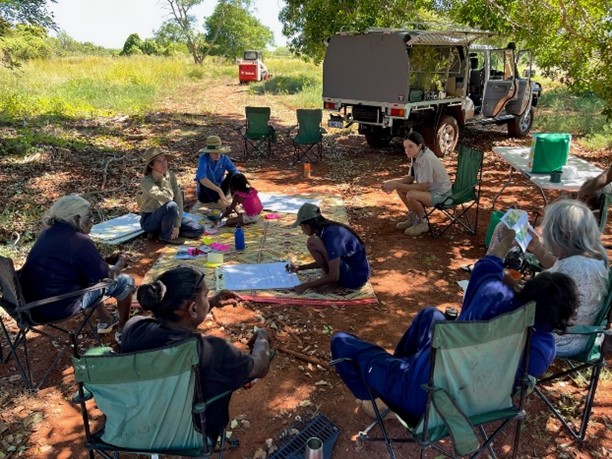
Karajarri Workshop, Purnturrpurnturr
EK collaborates respectfully and over the long term with Aboriginal rangers and their communities, First Nations groups, community groups, government, and scientists to apply traditional knowledge and the best scientific methods to CNRM projects including: invasive species and fire management; ecosystem restoration, threatened species, ecological survey, and monitoring; eco-cultural documentation and education.
EK’s Kimberley Community Seedbank (KCS) project was established in 2015 and EK has been working to develop the Seedbank into a sustainable social enterprise that furthers the conservation and protection of the Kimberley’s incredible natural and cultural values. In 2020, Environs Kimberley received a Strengthen Rural Communities (SRC) grant of $24,995, thanks to John T Reid Charitable Trusts, as funding towards Strengthening the Kimberley Community Seedbank: a sustainable social enterprise project.
A First Nations-led bush resource industry can support Aboriginal communities across the Kimberley to participate in economic development on their own terms and to undertake meaningful and sustainable work on Country. As a backdrop to this, the Australian bush resource industry has seen enormous growth over the past few decades, but despite this, a national survey by Bushfood Sensations (2019) found only 1% of the industry was led by First Nations people.
Hence, EK’s Sustainable Communities team has worked to build capacity for First Nations people to engage in and lead a Kimberley native plant resource industry. EK worked with four ranger groups to co-design business plans and complementary industry resources for two emerging social enterprises: Kimberley Seeds, and Wattleseed Collective where EK has supported Aboriginal collectors to develop skills in the exciting bush food and restoration industries to produce sustainable, socially responsible products.
The grant funded Environs Kimberley project management, co-design workshops, and the development of viable business models. EK delivered training to communities and ranger groups across the West Kimberley and established seed storage, roasting and cleaning infrastructure.
The Bardi Jawi Oorany Rangers, Karajarri Rangers, Nyangumarta Rangers, Yawuru Country Managers and Yiriman Women’s Bush Enterprise’s provided in-kind time and vehicle use for seed collection. EK provided in-kind time, seedbank and seed collecting equipment and coordinated volunteer activities. EK supported groups to develop their own business plans, financial models, packaging, marketing materials and a sales strategy.
EK coordinated the first pilot for commercial scale harvesting of wattleseed in 2022. The harvest saw the Wattleseed Collective gather and clean 40 kgs of (mostly) soap wattle (Acacia colei). This amazing effort resulted in sufficient product to enable Environs Kimberley to enter a product development phase and begin a process of securing access to markets for the coming year’s collections.
EK developed resources including a business plan template, a wattleseed harvesting guide, and wattleseed cleaning guide which are now available to share across the network of Kimberley-based Aboriginal-led businesses and individuals.
First Nations ranger programs are major employers in remote communities. By continuing to increase the capacity of the rangers in seed collection and social enterprise development, and working with other community members, Environs Kimberley is backing stronger communities to engage in the development of local, sustainable, conservation and cultural economies.
In Boyup Brook, WA, the Community Resource Centre wanted to encourage older locals to keep fit and healthy. Despite the large numbers in the area (49% of community members are over the age of 50) there was no exercise group locally catering to the older age bracket, who are at risk from a sedentary lifestyle which affects their health and puts subsequent pressure on local health services.
With four staff, 48 members and a committee of eight, the Boyup Brook Community Resource Centre (BBCRC) already plays a big part in the health and wellbeing of the community, hosting a visiting chiropractor, running a community garden, offering cancer support information and various other exercise classes.
The Centre applied to FRRR for funding to run a Seniors Exercise and Activity (SEA) Program. They felt the program would improve the cardio-fitness and mobility of elderly community members and fill an unmet need in the town, capturing “a segment of the population who will benefit from movement and activity but who don’t necessarily want to go to a more strenuous class.”
In July 2019, with a $4,419 Strengthening Rural Communities grant funded by the John T Reid Charitable Trusts, arrangements were made for the program to start. The Boyup Brook Town Hall was booked to provide a central, accessible and comfortable venue for participants. Equipment was purchased, and the class was advertised in the Boyup Gazette, on noticeboards in the community, the website, social media and also promoted by word of mouth.
Classes ran from August 2019 until June 2020, and were facilitated by CRC Manager Jodi Nield, who holds a Bachelor of Science (Sports Science) and has many years of experience in conducting similar projects. Through her position and involvement in the community, Jodi already had good rapport with local seniors.
Each session was planned to incorporate a variety of group and individual exercises, games and circuit activities that promoted fitness, flexibility, strength and balance. Participants were encouraged to exercise at their own pace with support from the instructor, and encouragement from fellow participants.
Funding also enabled the production of exercise booklets, which were a key component in enabling participants to continue their exercise at home when classes couldn’t be held face to face due to COVID-19 restrictions. Not everyone returned following the break, but the 40 sessions were still able to be conducted during the term of the project, with an average of 12 people attending each session.
“I am most proud of how the program was diverse and inclusive of disability. One participant was a leg amputee, and another an arm amputee. Others had restricted movement in knees, wrists and shoulders. Some had good levels of physical fitness, whereas others had limited fitness, however all were included in the program with alternative activities provided if required.”
Jodi Nield
Manager, Boyup Brook Community Resource Centre
This project not only improved the fitness and quality of life of these residents, but also their social connections and emotional wellbeing. Ms Nield noted that many of the participants were heading out for coffee following the sessions, and the whole community will indirectly benefit from a more connected and engaged senior demographic.
A Strengthening Rural Communities (SRC) grant from FRRR, funded with the support of the John T Reid Charitable Trusts, helped enhance the availability of fresh fruit, as well as create more inviting, welcoming and cool streets in the remote Indigenous communities of Peppimenarti and Nganmarriyanga in the Northern Territory.
Home to the Rakpeppimenarti people, the region is inaccessible for five months every year due to annual flooding, and faces extremely high infrastructure costs due to geographic scale and terrain. It was independently measured to be the most disadvantaged in the Northern Territory, and the second most disadvantaged in Australia.
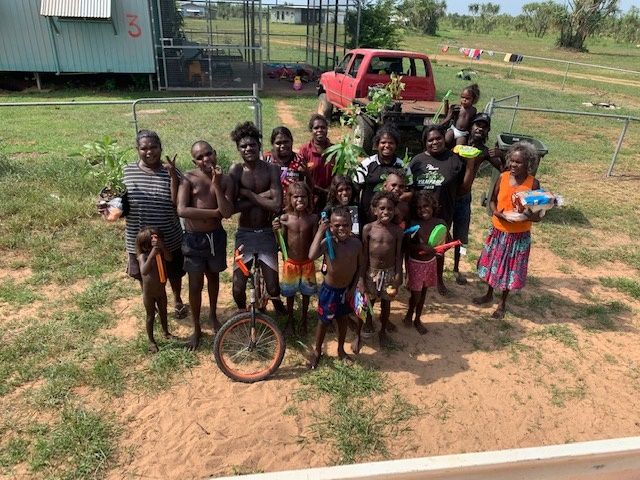
The West Daly Regional Council provides basic housing maintenance and essential municipal services to 13 homelands across 14,070 km2. While they work hard to provide high quality services to support the community, operating in a remote service delivery environment with limited financial resources is a challenge. However, they’ve identified that working with partners to improve service delivery and the quality of life for people in the West Daly region presents great opportunities.
In such extremely remote communities, food security is paramount – many of the homeland communities do not even have a shop and must travel vast distances for basic supplies. Fruit trees are a great resource in any community, as they contribute to support lifelong learning and education from Elders to young children, and promote individual and community health benefits in the form of delicious natural fruits straight from the tree, while enhancing and expanding the communities’ natural food resources.
They developed a project designed to engage community members in growing food and also create shady areas on the two homelands. In total, around 160 fruit trees and 45 shade trees were planted in designated public spaces near parks, ovals, and the local schools. The fruit trees selected included: lilly pillies, medlars, mulberries, custard apples, jaboticas, guavas, mangos and soursops. Shade trees included: native hibiscus, red coondoo, bloodwood and gum trees.
The Council used their $4,946 SRC grant to cover the costs of fruit trees and propagation powder, as well as contribute to freight – which accounted for more than 40% of the total cost of the project.
In Peppimenarti, the tree planting was done in collaboration with Peppimenarti School. About 50 trees were planted around the community with the assistance of Council Staff, CDP, Rangers, community students and teachers, totalling approximately 50 participants. A community barbeque was held after the tree planting to thank the participants for their support on this meaningful community project.
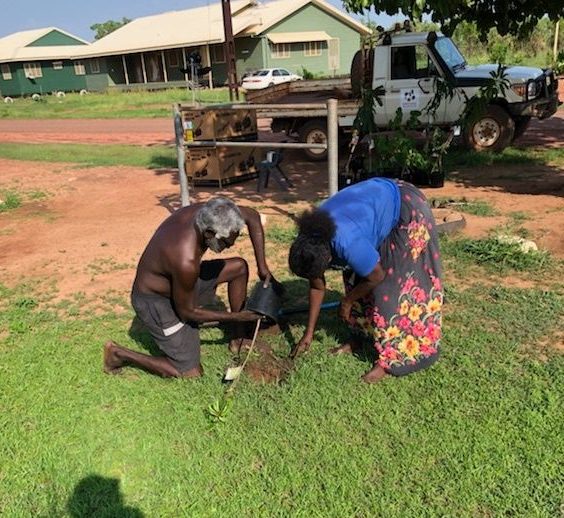
The Nganmarriyanga tree planting day was held in late December and was also a great success, with approximately 50 local men, women and children attending the activity. Trees were also provided to the residents of surrounding homelands such as Merrepen, Nemarluk, Nama and Wudapuli.
The Council provided significant in-kind support via staff labour and travel costs, and also purchased hormone rooting powder, so that cuttings can be taken which will allow further plantings. They have also assumed responsibility for ongoing plant maintenance to ensure the sustainability of the project.
Through this project, community members will gain access to healthy food grown locally, experience increased food security, and improved local plant knowledge. Further, the engagement will bring a positive impact to community spirit and local shade amenity.
“West Daly Regional Council would like to acknowledge the significant contribution of Foundation for Rural and Regional Renewal and its Donor Partner – John T Reid Charitable Trusts for the grant funding for our tree planting in Nganmarriyanga and Peppimenarti; a meaningful project that highly benefits our Indigenous Australians in our remote communities.”
Kristine Matienzo, Grants Manager, West Daly Regional Council

